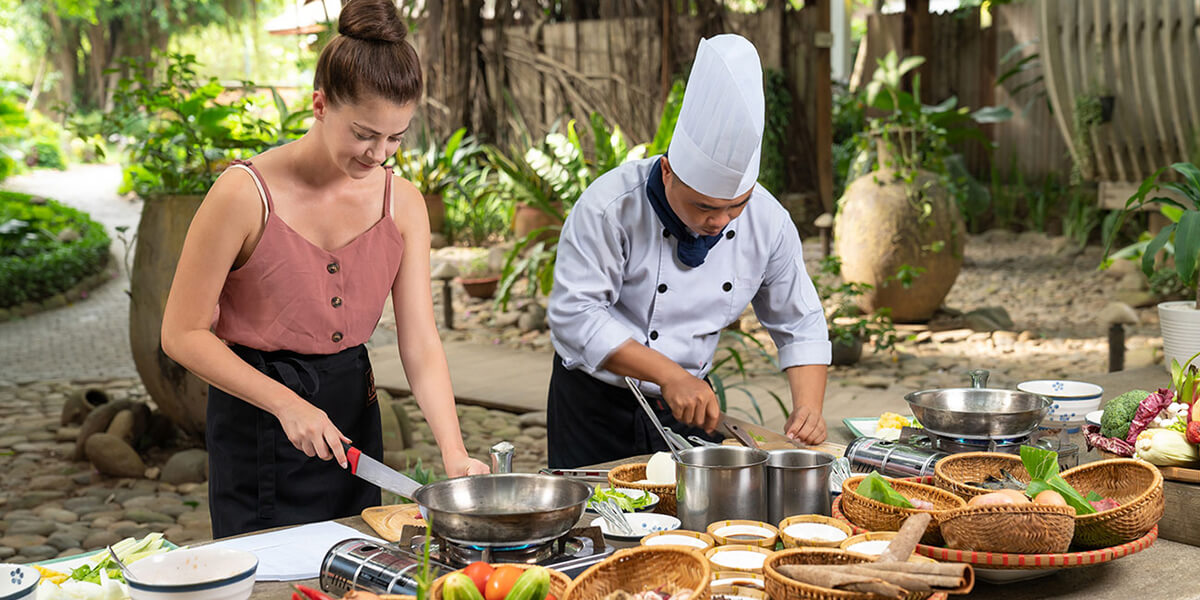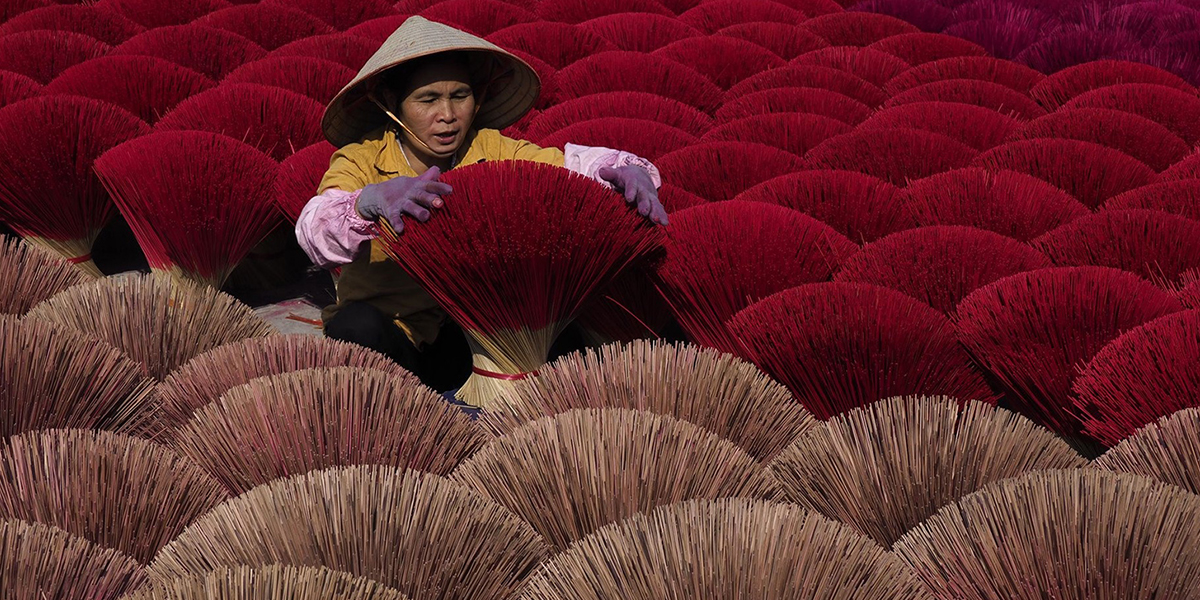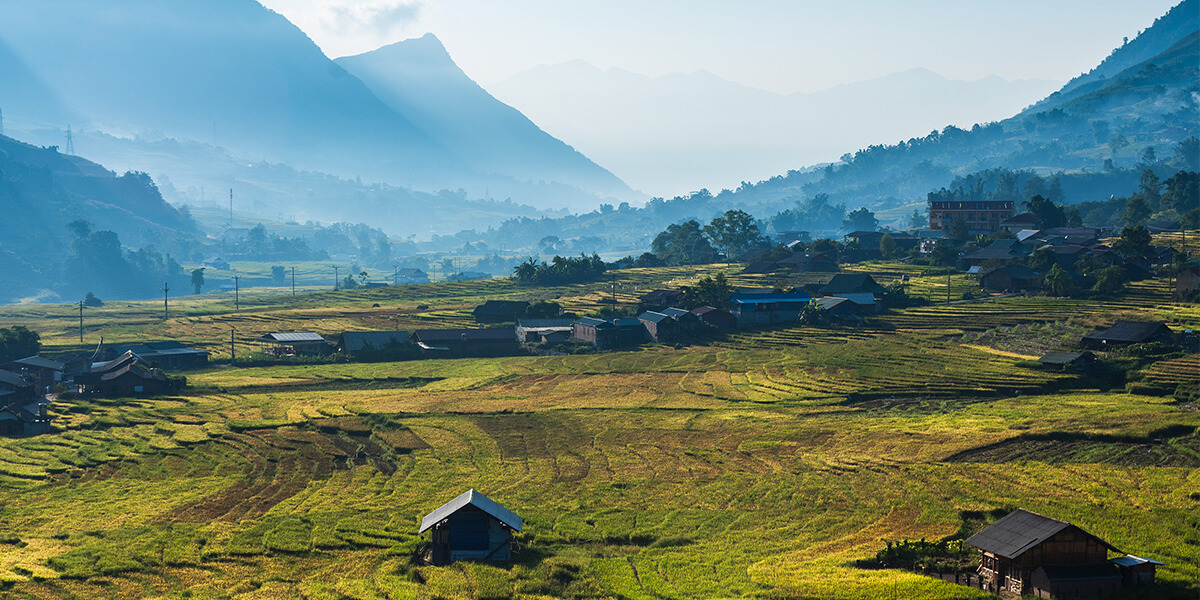I - Where is Duong Lam Village Vietnam?
Duong Lam, an ancient Vietnamese village, is located in Duong Lam commune, Son Tay town, Hanoi capital city - 45km from Hanoi city center to the west. This village consists of 9 hamlets, in which Mong Phu hamlet, Dong Sang hamlet, Cam Thinh hamlet, Doai Giap hamlet and Cam Lam hamlet bear the most cultural and architectural values.

Duong Lam Village is located in Duong Lam commune - 45km from Hanoi city center - Source: Internet
If you travel to the village by motorbike, you can park at Mong Phu village gate and walk around or rent a bike (80,000 - 100,000 VND/day ~ $3.5 - 4.4) to explore the village.
You may need: Popular motorbike rental shops in Hanoi
The entrance fee to the village is 20,000 VND/person ($0.87). The ticket counter is located next to Mong Phu village gate. Remember to ask for a travel map from the ticket seller.
II - The architecture of Duong Lam Ancient Village

The architecture of Duong Lam - Source: Internet
Duong Lam still bears the typical features of an old Vietnamese village with a banyan tree, a wharf on the river, village gate, village well, communal courtyards, temples,... The narrow roads in the village are paved with concrete and full of straw at harvesting time. Duong Lam, an ancient village with peaceful and nostalgic beauty, deserves the title “the hidden old town in Hanoi”.
1 - Mong Phu village gate of Duong Lam Village
Mong Phu village gate, located next to a 300-year-old banyan tree, a large lotus pond and a vast rice field, was built in the 16th century. Among many entrances to the village, the Mong Phu gate preserves many ancient features of old Vietnamese villages. It was made in the style of “Thuong Gia Ha Mon” which means that the upper is the house and the lower is the gate. Stepping through this gate, you see a narrow but clean brick-paved road leading to the center of the Duong Lam Ancient Village Hanoi with many relics.
2 - The ancient houses
There are about 956 ancient houses from 300 to 400 years old in the village, which are worth a look at. These wooden houses are made of laterite stones, bamboo, sapele, taipa, sawdust, terracotta brick, “mui ri” tile,...(Mui ri is an ancient type of tile in Vietnam with a curvy head) and often has 5 spans or 7 spans with 2 wings combined with a yard, garden, kitchen, water well, main house, barn,...
Some outstanding old houses in Duong Lam Ancient Village can be mentioned as:
- Mr Nguyen Van Hung’s house: 400-year-old house
- Mr Ha Nguyen Huyen’s house: 300-year-old house
- Mrs Duong Lan’s house: 250-year-old house
Many households in the village offer travel services such as accommodation, bike-renting, farm tours, meals,...
3 - Mong Phu communal house
The Mong Phu communal house covering an area of 1,800 m², built in the 18th century, is the place to worship the God Tan Vien. The large yard in front of the communal house of Duong Lam Village is the place for the locals to gather on special occasions. On both sides of the Mong Phu communal house, there are two ancient wells that look like two eyes of a dragon when looking from above.
Nghi Mon gate (main gate) of the communal house consists of 4 pillars: 2 larger pillars and 2 smaller ones made of bricks with the top point embossed with the images of the Four Holy Beasts (dragon - unicorn - tortoise - phoenix).

Mong Phu communal house in Duong Lam Village Hanoi - Source: Internet
On both sides of the yard are Ta Mac hall and Huu Mac hall, each of them having 5 small spans. The central hall is Dai Dinh, built in the style of “3 gian 2 chái” - a traditional Vietnamese architecture with 3 main spans & 2 sub-spans on both sides, which is. Every corner of Dai Dinh hall is sculptured sophisticatedly in the forms of dragons, fish, birds, flowers. Every hall in Mong Phu communal house all have curved roofs, roofted with deep red tiles.
4 - Ngo Quyen temple in Duong Lam Ancient Village
The temple and tomb of King Ngo Quyen (Ngo Quyen used to be a Vietnamese King, reigning from 939 to 944) is located on Cam hill - 2.2km from Mong Phu communal house. There is a vast paddy field in front of the temple.
5 - Mia pagoda
Mia pagoda, located in Dong Sang hamlet - 550m from Mong Phu communal house, has a large campus with a lot of trees. Passing the 2-storey Tam Quan gate with a curved roof, on the right side, you can see the 9-floor Cuu Pham Lien Hoa tower, each floor is decorated with lively images of dragon heads. Going through a small brick-paved yard, you can get to Chanh Dien hall where many valuable Buddha statues are placed.
III - Duong Lam Ancient Village cuisine
The cuisine in the village is also highly appreciated. You should not miss the following dishes:

Duong Lam cuisine - Source: Internet
Vietnamese nutty ginger sticky rice bars (Chè Lam)
The ingredients making this dish are ginger juice, sugar, glutinous rice flour, and peanuts. Che Lam is much preferred on cold days (ginger juice for keeping the body warm) and is often served with a cup of hot tea.
Vietnamese fermented soybean paste (Nước tương)
Fermented soybean paste is a kind of famous condiment in Vietnamese cuisine. Ingredients of this paste include soybeans, salt, rice and water. In Duong Lam Ancient Village Hanoi, you can see lots of earthen jars arranged neatly in a corner of the yard, which is used to brew the Fermented soybean paste.
Doi candy (Kẹo Dồi)
Doi candy is made from sugar, malt, peanut and sesame. When you eat it, you feel the greasy taste of peanuts and sesame, then the sweetness of sugar and malt
Vietnamese crispy roast pork
Duong Lam, an ancient Vietnamese village, is very famous for crispy roast pork with tender & juicy meat & incredibly brown crispy skin.
The bacon is marinated with pepper, garlic, chilies, onion, fish sauce and chopped guava leaves. The marinated pork is wrapped in a large bamboo pole lined with banana leaves inside. Grilled pork for 10 minutes on charcoal will be pierced with a sharp needle to make the fat melt, then is washed with salt water that is added some lemon juice to make the skin crispy and clean. The pork is then roasted for 3-5 hours.
Coming to Duong Lam Ancient Village, if you want to have lunch with the locals, you can ask the old house's owner. The normal meal includes dishes such as grilled pork, stir-fried vegetables,...and indispensable soy sauce. After the meal, you are invited to enjoy a tea break with Che Lam or Doi candy.
There are some restaurants in the village that you can refer to:
- Chiki Duong Lam - 350m from Mia pagoda
- Duong Lam kitchen near Mong Phu village gate
- Hung Hanh restaurant near Mong Phu village gate
IV - Duong Lam Ancient Village day tours

The Sinhtour - Source: Internet
The Sinhtour
- Tour price: 800,000 VND/person ($35) (include: transport fee, food, entrance fee, guide).
- Tour length: 1 day
- Add: No.85 Thuoc Bac street, Hoan Kiem district, Hanoi
- Phone number: 0243 999 6476
- Zalo/Viber/WhatsApp: 0977 00 1984 - 0947 00 1984
- Website: https://thesinhtour.com
Duong Lam Ancient Village Relic Management Board
The management board offers 2 types of tour with the price of 800,000 VND/person ($35): Farm tour & Traditional craft village tour
Contact:
- Hotline: 0243906227276 or 02433831080
- Website: https://duonglamvillage.com
- Email: vpttdlduonglam@gmail.com
Sinh Cafe Tourist
- Tour price: 800,000 VND/person ($35) (include: transport fee, food, entrance fee, guide).
- Tour length: 1 day
- Tour start: 8am
- Add: No.116 Hang Bac street, Hoan Kiem district, Hanoi
- Phone number: 0947401985
- Website: http://sinhcafetourist.com.vn/
Duong Lam Ancient Village Hanoi is famous for its antiquity and peace. It is the village road, the old house, the village well, the banyan tree...that create an idyllic, quiet but attractive old village.







 — Giang Phạm
— Giang Phạm





































